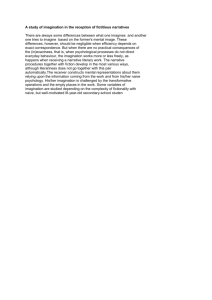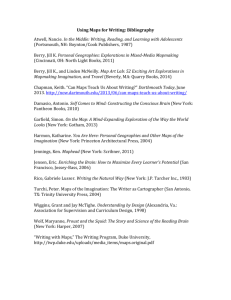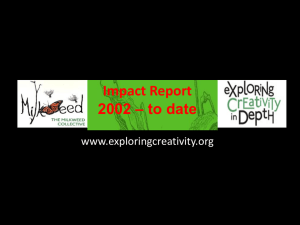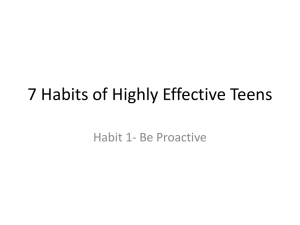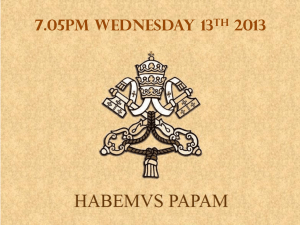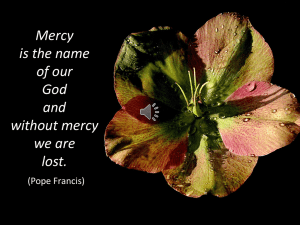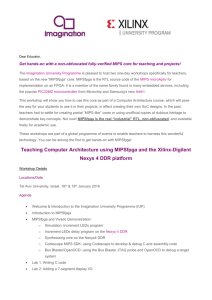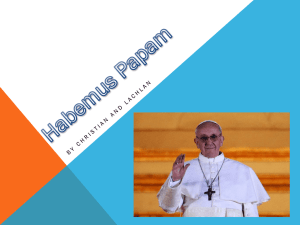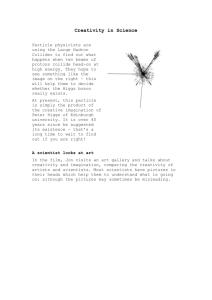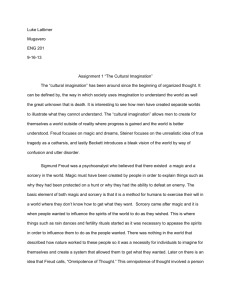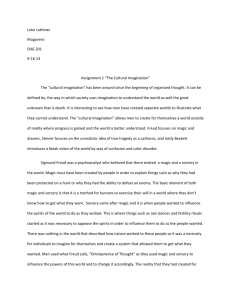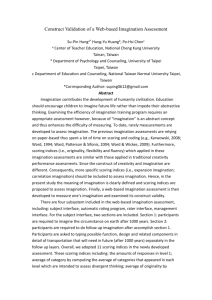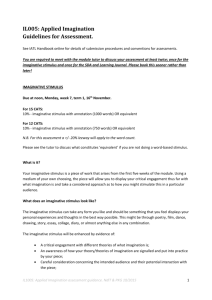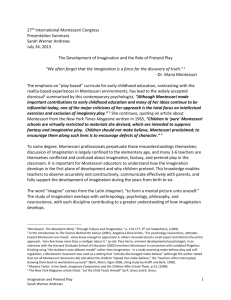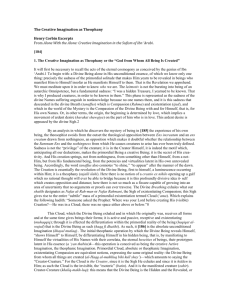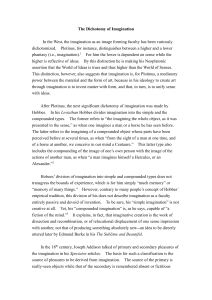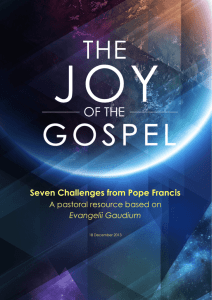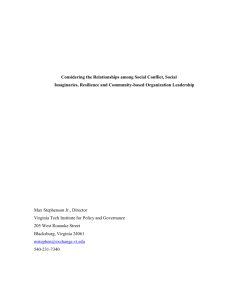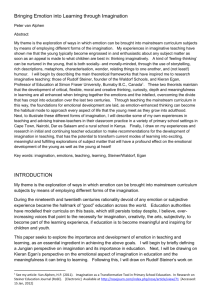Here
advertisement
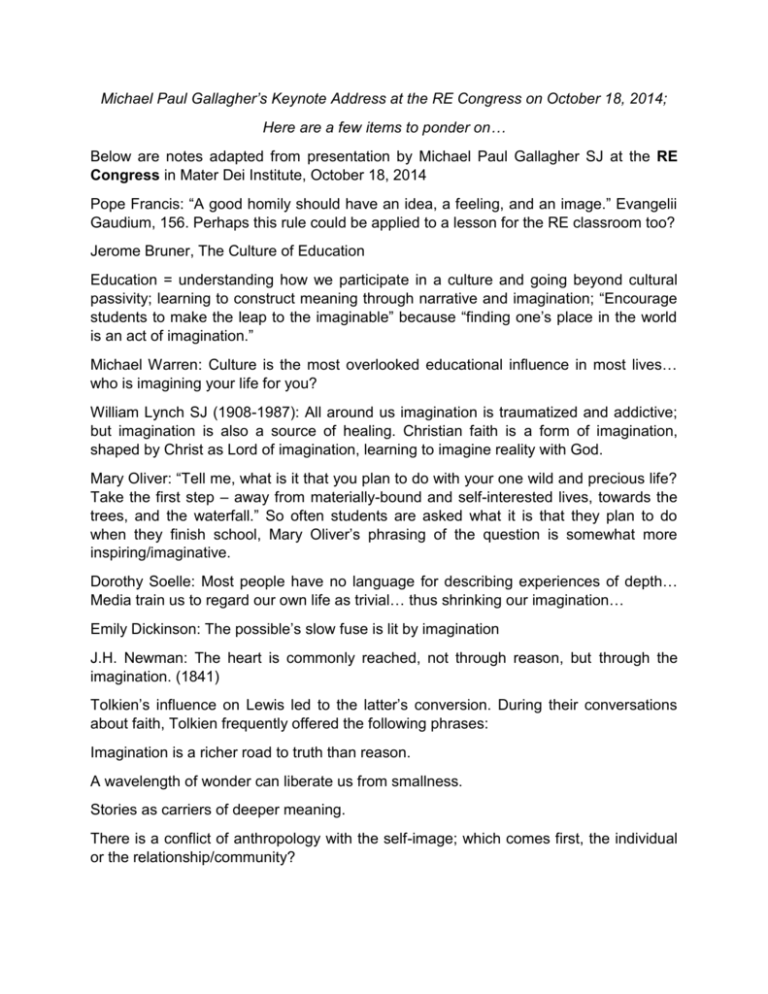
Michael Paul Gallagher’s Keynote Address at the RE Congress on October 18, 2014; Here are a few items to ponder on… Below are notes adapted from presentation by Michael Paul Gallagher SJ at the RE Congress in Mater Dei Institute, October 18, 2014 Pope Francis: “A good homily should have an idea, a feeling, and an image.” Evangelii Gaudium, 156. Perhaps this rule could be applied to a lesson for the RE classroom too? Jerome Bruner, The Culture of Education Education = understanding how we participate in a culture and going beyond cultural passivity; learning to construct meaning through narrative and imagination; “Encourage students to make the leap to the imaginable” because “finding one’s place in the world is an act of imagination.” Michael Warren: Culture is the most overlooked educational influence in most lives… who is imagining your life for you? William Lynch SJ (1908-1987): All around us imagination is traumatized and addictive; but imagination is also a source of healing. Christian faith is a form of imagination, shaped by Christ as Lord of imagination, learning to imagine reality with God. Mary Oliver: “Tell me, what is it that you plan to do with your one wild and precious life? Take the first step – away from materially-bound and self-interested lives, towards the trees, and the waterfall.” So often students are asked what it is that they plan to do when they finish school, Mary Oliver’s phrasing of the question is somewhat more inspiring/imaginative. Dorothy Soelle: Most people have no language for describing experiences of depth… Media train us to regard our own life as trivial… thus shrinking our imagination… Emily Dickinson: The possible’s slow fuse is lit by imagination J.H. Newman: The heart is commonly reached, not through reason, but through the imagination. (1841) Tolkien’s influence on Lewis led to the latter’s conversion. During their conversations about faith, Tolkien frequently offered the following phrases: Imagination is a richer road to truth than reason. A wavelength of wonder can liberate us from smallness. Stories as carriers of deeper meaning. There is a conflict of anthropology with the self-image; which comes first, the individual or the relationship/community? Imagination today is both vulnerable and transformative, it offers an alternative rationality, a more holistic road to wisdom. Pope Francis, we have seen him presented in a variety of unexpected images in the media, Madison Avenue spokesperson said that a marketing campaign worth several billion would not be as successful in gaining media interest. It is authentic and genuine; marketing could not compete with his authentic expression of Living the Gospel. Michael offers 7 keys to understanding Pope Francis: 1. He is someone who has changed a lot in life, who is coming from a different place or space, seeing reality from the margins, focus on essentials or core vision of faith, centrality of mercy/tenderness, battleground of attitudes/values. He has used the phrase “Time is higher than space” several times; referring to gradual journeys. 2. “My authoritarian way of making decisions led to problems and me being seen as ultraconservative. I went through a time of deep inner crisis. [But] the leaders of God’s people, like Moses, always leave space for doubt. Leave space for the Lord, not our certainties.” 3. “This could seem heresy, but more difficult than loving God is to allow yourself to be loved by God.” If a Christian does not pray and adopts rigid and moralistic attitudes, this just frightens people. It’s like Jonah who wants clarity without kindness or compassion. 4. The Church can be tempted in various ways: 1) to measure everything according to the society around; 2) to manage the Church like a business; 3) Clericalism instead of mature lay responsibility. Against all these, God is calling us into the present. 5. There is a joy in prayer, from being looked at by Jesus. And then the joy of giving this out to others should be evident in those who minister; we don’t want priests with faces as if soaked in vinegar. 6. The Pelagian temptation – pessimism about the world, excessive doctrinal security, restoration of an imagined past, looking like a perpetual funeral. The Gnostic temptation – to make everything psychology, a God a vague kind of spray. 7. There is a risk of becoming managers of God. Jesus created seven sacraments and we add another, the sacrament of passport control. Those who come to the Church should find the doors open to make possible an encounter with the love of Jesus. Here he is referring to the example of a couple wishing to begin the process for the Sacrament of Marriage, should the first question be “Have you a Baptismal Certificate?” Should they not at least first be congratulated and encouraged having made the decision to be married in the Church? Michael Paul also explored and discussed the following quotes from Pope Francis during his address: God becomes visible in the suffering face of young people without a future, in the shaky hands of forgotten old people, in the anxiety of many families facing life without any real support. Cardinal Bergoglio’s Lenten Message, 2013 prior to his election as Pope Francis. I see the Church like a field hospital after a battle. It is useless to ask someone badly wounded if they have high cholesterol. You have to heal their wounds. Later we can talk about other things. Pope Francis on his admiration for St. Peter Faber: “Dialogue with all, even the most distant or hostile; a simple piety, perhaps a bit innocent, his immediate availability to people, his gift of inner discernment, capable of strong decisions but also characterized by gentleness, even sweetness.” Has this admiration led to a direct influence on how he is approaching his own papacy perhaps? A tenderness that can give joy… is born from the personal certainty of being infinitely loved… God, becoming human, calls us into the revolution of tenderness. Evangelii Gaudium 3, 6, 88.
